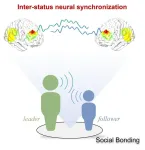(Press-News.org) Research Highlights:
Exposure to high heat may impair the cells of the immune system that remember specific viruses and germs and over-produce signaling molecules that can lead to inflammation.
Previous research testing participants’ blood on hot summer days largely only examined the effects of air temperature; they have not included analysis of the levels of immune-signaling molecules and markers of inflammation.
Embargoed until 3 p.m. CT/4 p.m. ET, Tuesday, March 19, 2024
CHICAGO, March 19, 2024 — Short-term exposure to higher heat may increase inflammation and interfere with normal immune system functions in the body, which may, in turn, increase susceptibility to infections and accelerate the progression of cardiovascular disease, according to preliminary research to be presented at the American Heart Association’s Epidemiology and Prevention│Lifestyle and Cardiometabolic Scientific Sessions 2024, March 18- 21, in Chicago. The meeting offers the latest science on population-based health and wellness and implications for lifestyle.
Inflammation is a normal part of the body’s defenses against injury or infection, however, an inflammatory response that is longstanding — lasting weeks to months — or that occurs in healthy tissues is damaging and plays a key role in the build-up of plaque in the arteries. This may lead to atherosclerosis. Heat waves are known to promote inflammation, however, studies examining air temperature and biomarkers of inflammation have had mixed results.
“Most research only considers temperature as the exposure of interest, which may not be adequate to capture a person’s response to heat,” said lead study author Daniel W. Riggs, Ph.D., an assistant professor of medicine in the Christina Lee Brown Envirome Institute at the University of Louisville in Louisville, Kentucky. “In our study, we used alternative measurements of heat in relation to multiple markers of inflammation and immune response in the body to investigate the short-term effects of heat exposure and produce a more complete picture of its health impact.”
Participants visited study sites in Louisville during the summer months for a blood test, and researchers analyzed the blood for multiple markers of immune system function. The researchers then examined associations between the markers of immune system function and heat levels, including temperature, net effective temperature (which factors in relative humidity, air temperature and windspeed) and the Universal Thermal Climate Index (UTCI) on that day. UTCI is a thermo-physiological model developed by the International Society of Biometeorology Commission that factors in temperature, humidity, wind speed and ultraviolet radiation levels, which was used to evaluate participant’s physical comfort.
The analysis found:
For every 5-degree increase in UTCI (in this study, the equivalent of going from a day with no thermal stress to a day with moderate thermal stress, Riggs said), there was an increase in the levels of key markers of inflammation: monocytes (4.2%), eosinophils (9.5%), natural killer T-cells (9.9%) and tumor necrosis factor-alpha (7.0%) in the blood. These immune molecules indicate activation of the body’s innate immune system, which spurs a fast and non-specific inflammatory response throughout the body to protect against pathogens and injury.
A decrease in B-cells (-6.8%), indicating the body’s adaptive immune system that remembers specific viruses and germs and creates antibodies to fight them, was lowered.
A lesser impact on the immune system was found when heat was measured by average 24-hour temperature or by net effective temperature, which incorporates humidity and wind but not sunshine.
“Our study participants only had minor exposure to high temperatures on the day of their blood test, however, even minor exposure may contribute to changes in immune markers,” Riggs said. “With rising global temperatures, the association between heat exposure and a temporarily weakened response from the immune system is a concern because temperature and humidity are known to be important environmental drivers of infectious, airborne disease transmission. Thus, during the hottest days of summer people may be at higher risk of heat exposure, they may also be more vulnerable to disease or inflammation.”
Adults older than age 60 and adults with existing cardiovascular disease are particularly at risk for heat-related cardiovascular events and deaths, Riggs explained. During heat waves, people can reduce their exposure by staying indoors when temperatures are highest and the sun is strongest; seeking shade; wearing light, breathable clothing; and drinking plenty of water.
“It’s important for physicians to communicate with patients about the risk of adverse health effects from heat exposure. For example, cardiologists could conduct customized consultations and assessments to increase patient awareness about their susceptibility to the effects of high temperatures. Also, changes to treatment regimens may be important to consider to address other risks. For example, some medications could make people more susceptible to heat-related illness or some may not be as effective when the body is exposed to high temperatures,” Riggs said.
Study details and background:
Participants included 624 adults. The average age of participants was 49.5 years; 59% of participants were women; and 77% self-identified as white race.
Data was collected in Louisville, Kentucky, from May through September of 2018 and 2019. The average 24-hour temperature on clinic visit days during the study time period was 24.5 degrees Celsius /76 degrees Fahrenheit.
Researchers examined participants’ blood levels of cytokines (signaling molecules that may lead to inflammation); natural killer cells and tumor necrosis factor-alpha; monocytes (white blood cells); and B cells (white blood cells that produce antibodies to fight specific infections).
Heat data, collected on the same day that participants’ blood was drawn, included 24-hour averages of temperature, net effective temperature and UTCI.
Researchers analyzed the associations between increasing heat metrics and changes in immune system measures. The results were adjusted for several individual factors, including the participants’ age, current tobacco use and years of education.
The study’s main limitation is that it includes participants’ blood test for one single point in time. Additionally, the researchers did not know how long individuals were exposed to outdoor heat stress before their blood was drawn. Future research will include a study design to observe changes over a period of time and possibly to examine the ability of green spaces like parks to reduce the harmful effects of high temperatures on inflammation in the body.
Co-authors, their disclosures and funding sources are listed in the abstract.
Statements and conclusions of studies that are presented at the American Heart Association’s scientific meetings are solely those of the study authors and do not necessarily reflect the Association’s policy or position. The Association makes no representation or guarantee as to their accuracy or reliability. Abstracts presented at the Association’s scientific meetings are not peer-reviewed, rather, they are curated by independent review panels and are considered based on the potential to add to the diversity of scientific issues and views discussed at the meeting. The findings are considered preliminary until published as a full manuscript in a peer-reviewed scientific journal.
The Association receives funding primarily from individuals; foundations and corporations (including pharmaceutical, device manufacturers and other companies) also make donations and fund specific Association programs and events. The Association has strict policies to prevent these relationships from influencing the science content. Revenues from pharmaceutical and biotech companies, device manufacturers and health insurance providers and the Association’s overall financial information are here.
Additional Resources:
Multimedia is available on the right column of the release link https://newsroom.heart.org/news/heat-exposure-may-increase-inflammation-and-impair-the-immune-system?preview=71a7b590bca722d682c824724a8486c5
After March 19, view abstract P297 in the EPI│Lifestyle Scientific Sessions 2024 Online Program Planner.
AHA news release: Heat-related cardiovascular deaths in the U.S. may more than double within decades (October 2023)
AHA news release: Risk of fatal heart attack may double in heat wave & high fine particulate pollution days (July 2023)
AHA resource: Protect Your Heart in the Heat
For more news from AHA EPI|Lifestyle Scientific Sessions 2024, follow us on X (formerly known as Twitter) @HeartNews, #EPILifestyle24.
###
The American Heart Association’s EPI|Lifestyle Scientific Sessions 2024 is the world’s premier meeting dedicated to the latest advances in population-based science. The 2024 meeting is in-person only, Monday through Thursday, March 18-21 at the Hilton Chicago. The primary goal of the meeting is to promote the development and application of translational and population science to prevent heart disease and stroke and foster cardiovascular health. The sessions focus on risk factors, obesity, nutrition, physical activity, genetics, metabolism, biomarkers, subclinical disease, clinical disease, healthy populations, global health and prevention-oriented clinical trials. The Councils on Epidemiology and Prevention and Lifestyle and Cardiometabolic Health (Lifestyle) jointly planned the EPI|Lifestyle Scientific Sessions 2024. Follow the conference on Twitter at #EPILifestyle24.
About the American Heart Association
The American Heart Association is a relentless force for a world of longer, healthier lives. We are dedicated to ensuring equitable health in all communities. Through collaboration with numerous organizations, and powered by millions of volunteers, we fund innovative research, advocate for the public’s health and share lifesaving resources. The Dallas-based organization has been a leading source of health information for a century. During 2024 - our Centennial year - we celebrate our rich 100-year history and accomplishments. As we forge ahead into our second century of bold discovery and impact, our vision is to advance health and hope for everyone, everywhere. Connect with us on heart.org, Facebook, X or by calling 1-800-AHA-USA1.
END
Heat exposure may increase inflammation and impair the immune system
American Heart Association Epidemiology and Prevention│Lifestyle and Cardiometabolic Health Scientific Sessions 2024, Abstract P297
2024-03-19
ELSE PRESS RELEASES FROM THIS DATE:
Rapid specific detection of oral pathogens using CRISPR-based diagnostics
2024-03-19
Alexandria, VA, USA – A study aiming to develop a low-cost, rapid detection technique for the widescale detection and screening of oral microorganisms suitable for point-of-care settings was presented at the 102nd General Session of the IADR, which was held in conjunction with the 53rd Annual Meeting of the American Association for Dental, Oral, and Craniofacial Research and the 48th Annual Meeting of the Canadian Association for Dental Research, on March 13-16, 2024, in New Orleans, LA, USA.
The abstract, ...
Polyphenol-mediated oxygenating hydrogel ameliorates periodontitis by targeting stem cell senescence
2024-03-19
Alexandria, VA, USA – A study aiming to develop a novel therapeutic strategy for periodontitis that targeted stem cell senescence by modulating the microenvironmental cues was presented at the 102nd General Session of the IADR, which was held in conjunction with the 53rd Annual Meeting of the American Association for Dental, Oral, and Craniofacial Research and the 48th Annual Meeting of the Canadian Association for Dental Research, on March 13-16, 2024, in New Orleans, LA, USA.
The abstract, “Polyphenol-Mediated Oxygenating Hydrogel Ameliorates Periodontitis By Targeting Stem Cell Senescence” was presented during the “Biologically ...
Sexual harassment goes unchecked in many sub-Saharan African newsrooms
2024-03-19
As much as 58% of sexual harassment reports lead to no action in sub-Saharan African newsrooms, study finds.
Sexual harassment often goes unchecked in sub-Saharan African newsrooms despite many employers having policies in place, according to a study conducted by City, University of London and the University of Maryland's Philip Merrill College of Journalism.
Researchers Dr Lindsey Blumell (City) and Dinfin Mulupi (Maryland) surveyed nearly 600 news professionals and analysed 17 anti-sexual harassment policies in newsrooms across eight sub-Saharan African countries between July and October 2020.
The study sampled data from Botswana, Kenya, Malawi, ...
Clemson astrophysicist’s research could provide a hint in the search for dark matter
2024-03-19
Dark matter is one of science’s greatest mysteries.
It doesn’t absorb, reflect or emit light, so we can’t see it. But its presence is implied by the gravitational effects it appears to have on galaxies.
Although dark matter makes up about 85 percent of the cosmos, scientists know very little about its fundamental nature.
Theories abound, and research by Clemson University postdoctoral fellow Alex McDaniel provides some of the most stringent constraints on the nature of dark matter yet.
His research also reveals a small hint of a signal that, if real, ...
A sneak-peak of the updated human salivary proteome wiki
2024-03-19
Alexandria, VA, USA – A Hands-on Workshop introducing the Updated Human Salivary Proteome (HSP) Wiki was presented at the 102nd General Session of the IADR, which was held in conjunction with the 53rd Annual Meeting of the American Association for Dental, Oral, and Craniofacial Research and the 48th Annual Meeting of the Canadian Association for Dental Research, on March 13-16, 2024, in New Orleans, LA, USA.
The information accumulated in the literature about salivary proteins, their expression, function, and role in health and disease has been made available by establishing the Human ...
Evaluating homelessness empathy through virtual reality among dental students
2024-03-19
Alexandria, VA, USA – A study aiming to determine experiential impact on student-empathy in relation to timing of when they experienced a VR-simulation of homelessness was presented at the 102nd General Session of the IADR, which was held in conjunction with the 53rd Annual Meeting of the American Association for Dental, Oral, and Craniofacial Research and the 48th Annual Meeting of the Canadian Association for Dental Research, on March 13-16, 2024, in New Orleans, LA, USA.
The abstract, “Evaluating Homelessness Empathy Through Virtual Reality Among Dental Students” was presented during the “Late Breaking Abstracts I” Poster Session ...
Smart connected oral health community (SMARTeeth)
2024-03-19
Alexandria, VA, USA – A study aiming to assess an innovative “SMARTeeth” program that provides a digital tool-enabled oral health screening for underserved pregnant women at an obstetric office facilitated by community health workers (CHWs). was presented at the 102nd General Session of the IADR, which was held in conjunction with the 53rd Annual Meeting of the American Association for Dental, Oral, and Craniofacial Research and the 48th Annual Meeting of the Canadian Association for Dental Research, on March 13-16, 2024, in New Orleans, LA, USA.
The abstract, “Smart Connected Oral ...
FGF-2 promotes periodontal healing in an osteoporosis model rat
2024-03-19
Alexandria, VA, USA – A study investigating the effects of local application of fibroblast growth factor (FGF-2) on periodontal healing in osteoporosis model rats was presented at the 102nd General Session of the IADR, which was held in conjunction with the 53rd Annual Meeting of the American Association for Dental, Oral, and Craniofacial Research and the 48th Annual Meeting of the Canadian Association for Dental Research, on March 13-16, 2024, in New Orleans, LA, USA.
The abstract, “FGF-2 Promotes Periodontal Healing in an Osteoporosis Model Rat” was presented during the “Periodontal ...
Social bonding gets people on the same wavelength
2024-03-19
When small hierarchical groups bond, neural activity between leaders and followers aligns, promoting quicker and more frequent communication, according to a study published on March 19th in the open-access journal PLOS Biology by Jun Ni from Beijing Normal University, China, and colleagues.
Social groups are often organized hierarchically, where status differences and bonds between members shape the group’s dynamic. To better understand how bonding influences communication within hierarchical groups and which brain regions are involved in these processes, the researchers recorded 176 three-person ...
Low social status increases risk of health problems from alcohol problems
2024-03-19
Men and women with lower income or education levels are more likely to develop medical conditions related to alcohol abuse compared to similar individuals with a higher socioeconomic status. Alexis Edwards of Virginia Commonwealth University, US, and colleagues report these findings in a new study published March 19th in the open access journal PLOS Medicine.
The World Health Organization estimates that harmful alcohol use accounts for 5.1% of the global burden of disease and injury worldwide, and results in three million deaths ...
LAST 30 PRESS RELEASES:
ASU researchers to lead AAAS panel on water insecurity in the United States
ASU professor Anne Stone to present at AAAS Conference in Phoenix on ancient origins of modern disease
Proposals for exploring viruses and skin as the next experimental quantum frontiers share US$30,000 science award
ASU researchers showcase scalable tech solutions for older adults living alone with cognitive decline at AAAS 2026
Scientists identify smooth regional trends in fruit fly survival strategies
Antipathy toward snakes? Your parents likely talked you into that at an early age
Sylvester Cancer Tip Sheet for Feb. 2026
Online exposure to medical misinformation concentrated among older adults
Telehealth improves access to genetic services for adult survivors of childhood cancers
Outdated mortality benchmarks risk missing early signs of famine and delay recognizing mass starvation
Newly discovered bacterium converts carbon dioxide into chemicals using electricity
Flipping and reversing mini-proteins could improve disease treatment
Scientists reveal major hidden source of atmospheric nitrogen pollution in fragile lake basin
Biochar emerges as a powerful tool for soil carbon neutrality and climate mitigation
Tiny cell messengers show big promise for safer protein and gene delivery
AMS releases statement regarding the decision to rescind EPA’s 2009 Endangerment Finding
Parents’ alcohol and drug use influences their children’s consumption, research shows
Modular assembly of chiral nitrogen-bridged rings achieved by palladium-catalyzed diastereoselective and enantioselective cascade cyclization reactions
Promoting civic engagement
AMS Science Preview: Hurricane slowdown, school snow days
Deforestation in the Amazon raises the surface temperature by 3 °C during the dry season
Model more accurately maps the impact of frost on corn crops
How did humans develop sharp vision? Lab-grown retinas show likely answer
Sour grapes? Taste, experience of sour foods depends on individual consumer
At AAAS, professor Krystal Tsosie argues the future of science must be Indigenous-led
From the lab to the living room: Decoding Parkinson’s patients movements in the real world
Research advances in porous materials, as highlighted in the 2025 Nobel Prize in Chemistry
Sally C. Morton, executive vice president of ASU Knowledge Enterprise, presents a bold and practical framework for moving research from discovery to real-world impact
Biochemical parameters in patients with diabetic nephropathy versus individuals with diabetes alone, non-diabetic nephropathy, and healthy controls
Muscular strength and mortality in women ages 63 to 99
[Press-News.org] Heat exposure may increase inflammation and impair the immune systemAmerican Heart Association Epidemiology and Prevention│Lifestyle and Cardiometabolic Health Scientific Sessions 2024, Abstract P297


